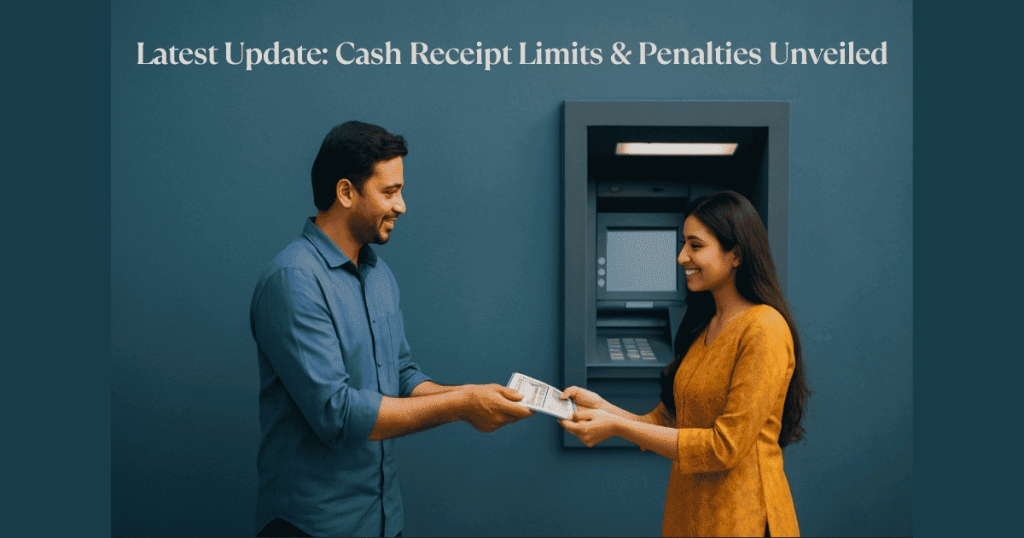A cash transaction involves the exchange of physical currency for payment or receipt, distinguishing it from digital methods such as bank transfers, UPI, checks, and credit cards
.
As per the Union Budget 2025–26, the Government of India has introduced new cash transaction limits to promote digital payments and curb unaccounted cash flows.
Types of Cash Transactions (for tax and accounting purposes):
- Cash Receipts – Money received in cash (e.g., sales income, rent, donations).
- Cash Payments – Money paid out in cash (e.g., wages, purchases).
- Cash Deposits – Depositing physical currency into a bank account.
- Cash Withdrawals – Withdrawing physical cash from a bank account.
Cash Transaction Limits
Section 185: Cash Receipt Restrictions
- Individuals are prohibited from receiving cash amounts exceeding ₹2,00,000.
- This restriction applies to loans, deposits, and specified sums related to real estate transactions.
- Exceptions include transactions with banks or governmental institutions.
Section 186: Daily Cash Transaction Limit
- No person should receive cash transactions exceeding ₹1,00,000 in a single day from a single individual.
- Splitting transactions to circumvent this limit is not permitted.
For example: Mr. Raj wants to buy gold worth ₹1,80,000 in cash from a jeweller.
What he does: To avoid the ₹2 lakh cash receipt limit , he tries to split the transaction:
- He pays ₹90,000 in cash from his own wallet.
- He asks his wife to pay the remaining ₹90,000 in cash from her wallet, on the same day.
Why this is NOT allowed: Even though the payments were made by two people (Raj and his wife), the total cash received by the jeweller for a single transaction (purchase of gold) is ₹1,80,000.
This is considered a single transaction related to one event or occasion, and the splitting is an artificial arrangement to bypass the law.
Section 269SS: Restrictions on Cash Loans and Deposits
- Accepting loans, deposits, or specified sums of ₹20,000 or more in cash is prohibited.
- Violations may result in a penalty equal to the amount accepted.
Section 269T: Restrictions on Cash Repayments
- Repaying loans or deposits of ₹20,000 or more in cash is prohibited.
- Non-compliance may attract a penalty equal to the amount repaid.
Section 40A(3): Cash Payment Limit for Business Expenditure
- Businesses cannot make cash payments exceeding ₹10,000 to a single person in a day for any expenditure.
- For payments to transporters, the limit is ₹35,000.
- Such payments are disallowed as deductions while computing taxable income.
Section 194N: TDS on Cash Withdrawals
- A 2% TDS is applicable on cash withdrawals exceeding ₹1 crore in a financial year.
- For non-ITR filers, the threshold is reduced to ₹20 lakh with a 5% TDS.
Penalties for Non-Compliance
- Section 271DA: Penalty equal to the amount received in cash in violation of Section 269ST.
- Section 271D: Penalty equal to the amount accepted in cash in violation of Section 269SS.
- Section 271E: Penalty equal to the amount repaid in cash in violation of Section 269T.
- Section 40A(3): Disallowance of the expenditure for which payment exceeding the specified limit is made in cash.
What is a High-Value Cash Transaction?
A high-value cash transaction is when you pay or receive large sums of money in cash that crosses certain thresholds either in one go or cumulatively over a financial year.
Types of High-Value Cash Transactions That Attract Income Tax Scrutiny
| Transaction Type | Limit | Who Reports the transactions? |
| Cash deposit in Savings A/C | ₹10,00,000 or more in a year | Banks/Post Offices |
| Cash deposit in Current A/C | ₹50,00,000 or more in a year | Banks/Post Offices |
| Cash payment for credit card bills | ₹1,00,000 (in cash) or ₹10,00,000 (any mode) | Banks |
| Cash purchase of immovable property | ₹30,00,000 or more (property value) | Registrar/Sub-registrar |
| Cash received for sale of goods/services | ₹2,00,000 or more in a transaction | Businesses/Professionals |
| Mutual Fund/FD/Insurance in cash | ₹10,00,000 or more in a year | Mutual Funds, NBFCs, Insurance Cos |
Reporting to the Income Tax Department
These transactions are reported through the Statement of Financial Transactions (SFT) filed by institutions like banks, mutual fund houses, etc.
Automatic Flag in PAN
PAN is linked to all these transactions. The IT department uses data analytics to track unusual patterns.
Income Tax Notice or Scrutiny
Income Tax Issues the following :
- A compliance notice asking for source of funds
- A demand to file or revise your ITR
- A scrutiny assessment if the transaction doesn’t match your reported income
Penalty & Interest
If unexplained cash is treated as undisclosed income under Section 69A, it will be:
Taxed at 60% + surcharge + cess = 78%
Subject to penalty under Section 271DA or 271D (up to 100% of the amount)
Penalty imposed by : Joint Commissioner.
Want To Know More About TDS on Cash Withdrawal Click Here
FAQs
The limit for cash deposits in a current account is ₹50 lakhs in a financial year. Any amount beyond this is reported.
Yes, but only up to ₹1 lakh in cash is allowed. If more than ₹1 lakh is paid in cash towards credit card bill, the bank shall report it to the IT Department.
No. Splitting a transaction to bypass the ₹2 lakh limit is illegal and considered tax evasion. The IT Department may still treat it as a single transaction and impose penalties.
Yes. High-value cash transactions that don’t align with declared income in the Income Tax Return (ITR) may trigger notices or audits.


